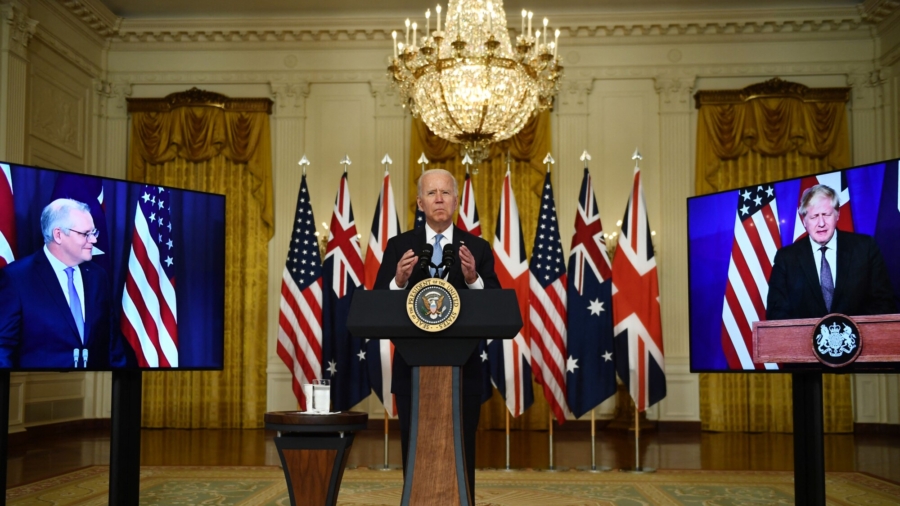President Joe Biden, along with other leaders from the trilateral AUKUS international defense partnership, announced on April 5 the group will join in an effort to develop hypersonic missiles.
The pact between Australia, the United Kingdom and the United States, known as AUKUS, was announced in September 2021. Its main piece is a plan to build a fleet of conventionally armed, nuclear-powered submarines for the Australian military as part of a security effort in the Indo-Pacific region.
The three leaders—Australian Prime Minister Scott Morrison, UK Prime Minister Boris Johnson, and Biden—issued an agreed statement on April 5, renewing commitment to the partnership and announcing plans for hypersonics.
“We also committed today to commence new trilateral cooperation on hypersonics and counter-hypersonics, and electronic warfare capabilities, as well as to expand information sharing, and to deepen cooperation on defense innovation,” the statement reads.
The announcement comes as news breaks about the United States quietly testing a hypersonic missile in March, first reported by CNN and later confirmed to The Epoch Times by a Pentagon official. The Hypersonic Air-breathing Weapon Concept (HAWC) missile was launched on the West Coast from a B-52 bomber, the official said.
The missile reached Mach 5 for an extended period of time, ascended to altitudes greater than 65,000 feet, and flew for more than 300 nautical miles, according to a release from the Defense Advanced Research Projects Agency (DARPA), marking what the agency says is its second successful flight in DARPA’s HAWC program.
Air-breathing vehicles utilize air captured from the atmosphere to achieve sustained propulsion. The speed and maneuverability of such hypersonic cruise missiles allow both evasion of defenses and quick strikes. Their kinetic energy can effectively destroy targets—even without high explosives, according to DARPA.
China has also developed, and successfully tested, its own hypersonic missile in recent years. The Chinese launch was first confirmed by the Pentagon in October 2021.
While the Biden administration has insisted that the AUKUS deal is “not aimed [at] or about any one country,” many view it as a response to the increasingly assertive actions taken by China in the Indo-Pacific region.
During Department of Defense (DOD) budget hearings on April 5, Gen. Mark Milley, Chairman of the Joint Chiefs of Staff, warned of the potential for future conflicts with both China and Russia as the DOD seeks $773 billion in increased defense spending from Biden’s budget.
“We are now facing two global powers, China and Russia, each with significant military capabilities, both [of whom] intend to fundamentally change the rules-based global order,” said Milley. “We are entering a world that is becoming more unstable, and the potential for significant conflict between international powers is increasing not decreasing.”
A “fact sheet” issued by the White House on April 5 includes updates on the progress of building a fleet of nuclear-powered submarines for the Australian military.
The three AUKUS countries entered into a Naval Nuclear Propulsion Information Agreement (ENNPIA) on Feb. 8 to share information trilaterally.
Morrison announced on March 7 Australia’s plan to establish a future submarine base on the country’s East Coast. And the Australian government is working to secure land to build the construction yard for the nuclear subs.
The three countries have also made progress developing quantum technologies, artificial intelligence, and undersea capabilities, according to the White House.
From The Epoch Times


